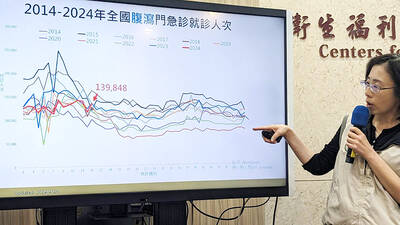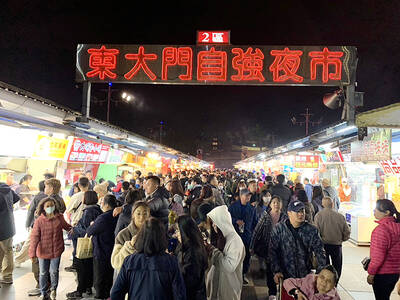The National Communications Commission (NCC) said it is to consult with the agencies in charge of national security to determine if local companies can use base stations produced by Chinese telecommunications equipment suppliers.
The commission made the comments after it issued operational licenses on Wednesday last week to three of the six telecom service carriers that are to launch 4G services in Taiwan, including Chunghwa Telecom, Taiwan Mobile and Far EasTone Telecommunications.
Another telecom company, Ambit Microsystems, is still awaiting its license, pending the approval of the 4G network construction plan it submitted to authorities on March 11. According to the commission, Ambit’s plan involves using base stations manufactured in China.
An article published in the Chinese-language United Daily News last week reported that Ambit’s proposal involves using base stations made by Shenzhen-based Huawei Technologies Co.
According to the article, Ambit justified its planned used of stations produced by Chinese manufacturers by saying that the National Security Bureau only prohibits local telecoms from using China-made core facilities, which exclude base stations, mobile phones and network interface cards.
Security concerns over the use of Huawei equipment have been voiced in the US, UK and other countries by those who say the telecom giant’s products may have been secretly designed to allow the Chinese government and military unauthorized access to foreign networks.
In its statement, the commission said that Chinese telecom equipment manufacturers are not the only suppliers of base stations, so not using equipment made in China will not delay the establishment of domestic 4G networks.
It added that the legislature’s Transportation Committee passed a resolution last year requiring that the commission completely prohibit the use of the Chinese-made telecom equipment by the nation’s 4G operators.
“As the commission is not in charge of the national security issues, we can only abide by the resolutions made by the agencies in charge of the relevant affairs. We have officially requested these agencies to quickly come to a decision on Ambit’s proposed use of the China-made base stations,” the commission said.
In related developments, the commission has announced that it will soon issue 34 radio broadcasting licenses, including one for national broadcasting, nine for medium-power radio stations and 22 for small-power radio stations in the frequency modulation (FM) band, as well as two licenses for small-power stations operating in the amplified modulation (AM) band.
To grant the national broadcasting license and the medium-power radio station ones, the commission said it will first review the interested parties’ qualifications and then stage an auction.
The remaining licenses are to be issued through a combination of qualification reviews and a draw, it added.
The commission said it encouraged small or medium-power stations to merge to acquire the medium-power or national broadcasting licenses.
It also encouraged small-power stations to bid for medium-power permits so they can serve listeners in Hualien and Taitung counties, and outlying islands.

THE HAWAII FACTOR: While a 1965 opinion said an attack on Hawaii would not trigger Article 5, the text of the treaty suggests the state is covered, the report says NATO could be drawn into a conflict in the Taiwan Strait if Chinese forces attacked the US mainland or Hawaii, a NATO Defense College report published on Monday says. The report, written by James Lee, an assistant research fellow at Academia Sinica’s Institute of European and American Studies, states that under certain conditions a Taiwan contingency could trigger Article 5 of NATO, under which an attack against any member of the alliance is considered an attack against all members, necessitating a response. Article 6 of the North Atlantic Treaty specifies that an armed attack in the territory of any member in Europe,

FLU SEASON: Twenty-six severe cases were reported from Tuesday last week to Monday, including a seven-year-old girl diagnosed with influenza-associated encephalopathy Nearly 140,000 people sought medical assistance for diarrhea last week, the Centers for Disease Control (CDC) said on Tuesday. From April 7 to Saturday last week, 139,848 people sought medical help for diarrhea-related illness, a 15.7 percent increase from last week’s 120,868 reports, CDC Epidemic Intelligence Center Deputy Director Lee Chia-lin (李佳琳) said. The number of people who reported diarrhea-related illness last week was the fourth highest in the same time period over the past decade, Lee said. Over the past four weeks, 203 mass illness cases had been reported, nearly four times higher than the 54 cases documented in the same period

Heat advisories were in effect for nine administrative regions yesterday afternoon as warm southwesterly winds pushed temperatures above 38°C in parts of southern Taiwan, the Central Weather Administration (CWA) said. As of 3:30pm yesterday, Tainan’s Yujing District (玉井) had recorded the day’s highest temperature of 39.7°C, though the measurement will not be included in Taiwan’s official heat records since Yujing is an automatic rather than manually operated weather station, the CWA said. Highs recorded in other areas were 38.7°C in Kaohsiung’s Neimen District (內門), 38.2°C in Chiayi City and 38.1°C in Pingtung’s Sandimen Township (三地門), CWA data showed. The spell of scorching

HOSPITALITY HIT: Hotels in Hualien have an occupancy rate of 10 percent, down from 30 percent before the earthquake, a Tourism Administration official said The Executive Yuan yesterday unveiled a stimulus package of vouchers and subsidies to revive tourism in Hualien County following a quake measuring 7.2 on the Richter scale. The tremor on April 3, which killed at least 17 people and left two others missing, caused the county an estimated NT$3 billion (US$92.7 million) in damages. The Ministry of Economic Affairs is to issue vouchers worth NT$200 at the price of NT$100 for purchases at the Dongdamen Night Market (東大門夜市) in Hualien City to boost spending, a ministry official told a news conference after a Cabinet meeting in Taipei. The ministry plans to issue 18,400